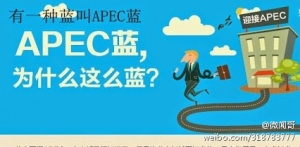“APEC blue”的版本间的差异
来自China Digital Space
小 (文本替换 - 替换“Category”为“分类”) |
|||
| 第18行: | 第18行: | ||
{{ #dpl: linksto = {{FULLPAGENAME}} }} | {{ #dpl: linksto = {{FULLPAGENAME}} }} | ||
| − | [[ | + | [[分类:Lexicon]][[分类:Resistance Discourse]] |
2023年8月7日 (一) 05:01的最新版本
APEC lán | APEC蓝
Color of the skies over Beijing during the Asia Pacific Economic Cooperation (APEC) summit in November 2014.
In an effort to cut air pollution by 40% for the APEC summit, the city gave students and workers a bonus "Golden Week" holiday, halted factory and construction work, enacted alternate driving days for even- and odd-numbered license plates, and even put a temporary stop to barbecues and cremations. The skies were indeed bluer, but the extent of the improvement was tough to measure. Air quality data from the U.S. embassy, available to denizens on the China Air Quality Index app and considered more reliable than municipal reports, was censored. "APEC blue" thus describes a hue reserved for foreign dignitaries that cannot be quantified:
@宋英杰: It's said that Beijing only had two cases of smog this year: once before APEC, and once after. (November 19, 2014)
据说,北京今年其实只有两次雾霾:一次APEC前,一次APEC后。 [Chinese]
@财经女记者部落: #APECblue tells us: It's not that the government can't do it, it's that you aren't important! (November 6, 2014)
#APEC蓝# 告诉我们:不是政府做不到,是你们不重要![Chinese]
Government efforts to temporarily clean up air pollution ahead of high-profile international events were prominently used during the 2008 Beijing Olympics, and have since been increasingly used in other cities across China. In December 2016, as many Chinese cities were experiencing toxic air pollution levels, a study showing that quick fixes are often followed by the intense deterioration of air quality was publicized by the South China Morning Post.





